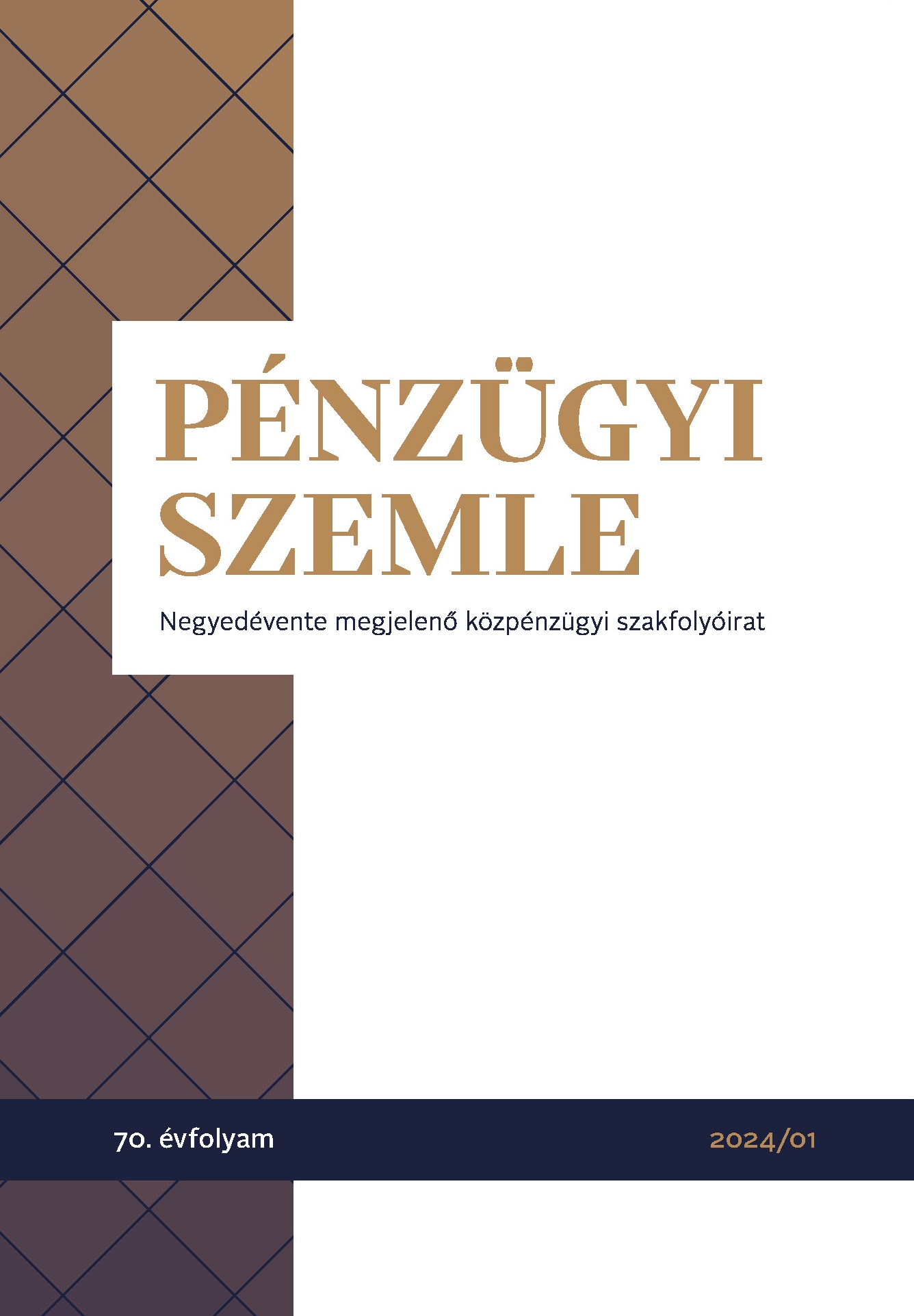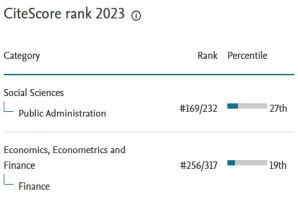Digitalizáció, digitális transzformáció – a Nemzeti Adó- és Vámhivatal gyakorlatában
DOI:
https://doi.org/10.35551/PFQ_2024_1_5Kulcsszavak:
H21, H26, H71, H83, M48Absztrakt
Kutatásunkkal igazoltuk, hogy a digitális megoldások növelték a Nemzeti Adó- és Vámhivatal (a továbbiakban NAV) által elvégzett hatósági ellenőrzések hatékonyságát, általuk könnyebben összehasonlíthatóvá váltak az adóhatósági és az adózói adatok. Újfajta szemlélet honosodott meg a digitalizációs megoldások hatására a NAV-nál. A hatások összességében pozitívak, szinergia hatás érvényesül a NAV és az adózók között. A kezdeteket követően a jelenkor digitális megoldásait tekintjük át és a közeljövő fejlődési lehetőségeit térképezzük fel több kutatási módszer segítségével. Mit adott és mit adhat számunkra a NAV digitalizációs tevékenysége? Időt, hatékonyságot, gördülékenyebb ügyintézést, többféle lekérdezési lehetőséget adózók és partnereik vonatkozásában. Szemléletváltást, átalakuló ellenőrzési módszertant, permanens változást. Átalakuló munkaköröket, a mesterséges intelligencia felhasználási lehetőségét. Az ellenőrzések középpontjában továbbra is az emberi tevékenységek vizsgálatai fognak állni, azonban az emberi tényező szerepe csökken az ellenőrzések során.
Hivatkozások
PM Decree 13/2020 (XII.23.) (EKÁER Decree)
Act CXXII of 2010 on the National Tax and Customs Administration
Act CCXXII of 2015 on electronic administration and general rules on trust services
Act CL of 2017 on the Rules of Taxation
Act CLI of 2017 on the Tax Administrative Procedure
ÁCS ISTVÁN – KOVÁCS LÁSZLÓ (2021). ONYA services will be further expanded, SZAKma 2021(3). pp 18-19.
It’s easy to pay taxes – interview with Ferenc Vágujhelyi, Head of NAV (2021). eGOV Newsletter – Public Administration & Informatics. Online: https://hirlevel.egov.hu/2021/09/26/adozni-konnyen-is-lehet-interju-vagujhelyi-ferenccel-a-nav-vezetojevel/
ALM, J., – SANCHEZ, I. – DE JUAN, A. (1995). economic and noneconomic factors in tax compliance, Kyklos. 48: 3-18, https://doi.org/10.1111/j.1467-6435.1995.tb02312.x
ÁDÁM BALOG (2014). Tax evasion and hidden economy in Hungary. Public Economy 2014/4 – special issue on tax policy Online: https://www.mnb.hu/letoltes/balog-15-30.pdf
ERIKA BÁN (2019). The basics of auditing. Perfekt Publishing House, Budapest.
ERIKA BÁN – PÉTER SALAMON – BERNADETT VOLTERNÉ CSÁK (2020). Corporate auditing practices. Perfekt Publishing House, Budapest.
BRITACOM (2021). China issues guideline to improve tax collection, management Online: https://www.britacom.org/xw_7086/news/202106/t20210604_1118390.html
CSEDŐ ZOLTÁN – ZAVARKÓ MÁTÉ (2019). Change leadership. Budapest: Akadémiai Kiadó, https://doi.org/10.1556/9789634544104
More and more EU countries are interested in Hungarian tools for economic whitening (2018). Online: https://2015-2019.kormany.hu/hu/nemzetgazdasagi-miniszterium/hirek/egyre-tobb-unios-orszag-erdeklodik-a-gazdasagfeherites-magyar-eszkozei-irant
FAJCSÁK GÁBOR (2021). NAV tax audits – a change of approach, NAV 2.0 Online: https://ado.hu/ado/nav-adoellenorzesek-szemleletvaltas-nav-2-0/
FUNTEK ZSOLT (2020). How to become a tax-conscious society. SZAKma 2020(9). pp 23-25.
ZSOLT FUNTEK (2021). Online invoicing – the third step. SZAKma 2021(1). pp 11-12.
GONG, C., – RIBIERE, V. (2021) Developing a unified defini-tion of digital transformation, Technovation, Vol. 102. https://doi.org/10.1016/j.technovation.2020.102217
HARTVIG ÁRON DÉNES – MADARI ZOLTÁN – OROSZNÉ CSESZNÁK ANITA – PAP ÁRON – WIMMER ÁGNES (2023). Economic Review LXX, June 2023 pp 672-689., https://doi.org/10.18414/KSZ.2023.6.672
Digitisation in Hungary 2022 Digimeter project (2022) – Autumn 2022 Research among small and medium-sized enterprises. Online: https://digimeter.hu/kutatasok/
NORBERT IZER (2019). Member States must join forces against tax evaders. Online: https://ado.hu/ado/izer-tagallami-osszefogas-kell-az-adocsalok-ellen/
JACOBI, H-F. – LANDHERR, M. (2013). importance of the driver information and communication technology for the competitiveness of industrial production In Westkämper, E.; Spath, Dieter, Constantinescu, C; Lentes, J. (Eds.): Digital Production. Berlin: Springer, p.41.
KAGERMANN, H.; – WAHLSTER, W.; – HELBIG, J. (2013). implementation recommendations for the future project INdustry 4.0. final report of the working group Industry 4.0. securing Germany’s future as a production location. pp 17.-85.
KATONA ANDREA – BIRKNER ZOLTÁN – NÉMETH KORNÉL – PÉTER ERZSÉBET (2023). Preparing for industrial digitalisation in domestic firms of different sizes. Management Science, Vol. LIV 2023(6) pp 47-59. https://doi.org/10.14267/VEZTUD.2023.06.04
KIRCHLER, E.- HOELZL, E.-WAHL, I. (2008). Enforced versus voluntary tax compliance: the “slippery slope” framework. Journal of Economic Psychology, Vol. 29 (2) pp 210-225. https://doi.org/10.1016/j.joep.2007.05.004.
KOGLER, C. – MUEHLBACHER, S. – KIRCHLER, E. (2015) Testing the “slippery slope framework” among self-employed taxpayers. Economics of Governance, Vol. 16(2) pp 125-142. http://dx.doi.org/10.1007/s10101-015-0158-9
LUKOVSZKI LÍVIA – RIDEG ANDRÁS – SIPOS NORBERT – VÖRÖÖ ZSÓFIA (2023). An empirical study of the propensity to evade tax. Economic Review, Vol. LXX, pp 192-212. https://doi.org/10.18414/KSZ.2023.2.192
ÁGNES JUDIT MÉREY (2019). The current state of the esja system. SZAKma 2019(3). pp 10-11.
Association of Certified Accountants survey (2020). Online: https://www.billingo.hu/blog/olvas/hogyan-segitik-a-konyvelok-munkajat-a-digitalis-megoldasok
NAV 2.0 Strategic Programme for Renewal
KRISZTINA NEMES-SOMOGYI (2018). electronic control, Adóvilág XXII. (05). pp 2-5.
OECD Recommendations for promoting industrial transformation in EU countries and regions (2019). Online: https://ec.europa.eu/regional_policy/hu/newsroom/news/2019/11/14-11-2019-commission-and-oecd-publish-recommendations-to-help-eu-countries-and-regions-achieve-industrial-transition
Summary tables (STADAT) (2022). https://www.ksh.hu/stadat
REZSŐ RÓZSAI (2020). We have to adapt to circumstances – Interview with Rezsővel Rózsai. SZAKma 2020(5). pp 8-10.
TAKÁCSNÉ GYÖRGY KATALIN-DOBOS PIROSKA (2018). Factors affecting the willingness to pay taxes. Economy and Society, Vol. 3-4, pp 35-53. https://doi.org/10.21637/gt.2018.3-4.03.PUBLIC FINANCE QUARTERLY, 2024/1 STUDIES 107
UHL, A. – GOLLENIA, L. A. (2016). digital enterprise transformation: a business-driven approach to leveraging innovative IT. routledge.
VAT rules and rates (2022). Online: https://europa.eu/youreurope/business/taxation/vat/vat-rules-rates/index_hu.htm#shortcut-5
VERHOEF, P. C., – BROEKHUIZEN, T., – BART, Y., – BHATTACHARYA, A., – DONG, J. Q., – FABIAN, N., – HAENLEIN, M. (2021). digital transformation: a multidisciplinary reflection and research agenda. Journal of Business Research, 122, pp 889-901. https://doi.org/10.1016/j.jbusres.2019.09.022
##submission.downloads##
Megjelent
Hogyan kell idézni
Folyóirat szám
Rovat
License
Authors assign copyright to Pénzügyi Szemle / Public Finance Quarterly. Authors are responsible for permission to reproduce copyright material from other sources.












